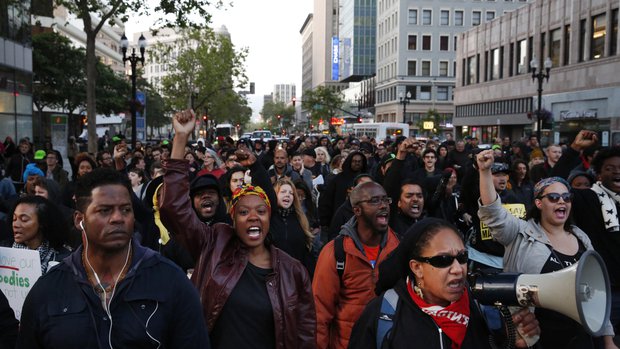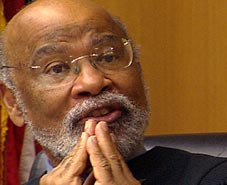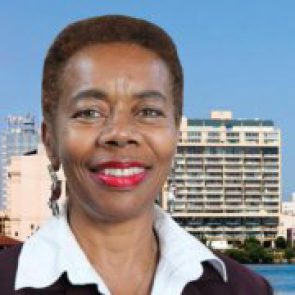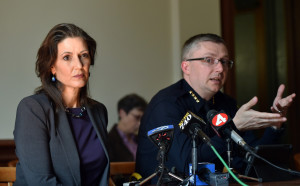Judge Thelton Henderson Will Monitor Investigations of Three OPD Shootings in 2015
Jun 12, 2015
Posted in Ferguson/Black Lives Matter, Police-Public Safety

Judge will also review Mayor Schaaf’s nighttime protest restrictions
Oakland protesters, May 23. Photo courtesy of the SF Chronicle/Leah Mills via AP.
By Ken A. Epstein
Federal Judge Thelton Henderson is monitoring how the Oakland Police Department (OPD) is handling the investigations of three officer-involved shootings this year, including the killing this past weekend of Demouria Hogg, 30, of Hayward.

“We will closely monitor the (OPD) investigations and (internal review board) presentations on these incidents,” wrote Compliance Director Robert Warshaw in a report issued June 8 on the progress of police department reforms.
Warshaw was appointed by Judge Henderson to oversee Oakland’s efforts to comply with the Negotiated Settlement Agreement (NSA), which requires the city to institute polices and practices that protect the constitutional rights of local residents.
Warshaw noted that prior to these shootings in 2015, OPD had not been involved in an officer-involved shooting for about for about two years.
Besides the killing of Hogg on Saturday at the Lakeshore off-ramp of Highway 580, two other incidents this year involved “mentally disturbed” suspects.
“In the first case, the officer’s two rounds missed the mentally disturbed subject, who retreated and surrendered; in the second case – which also involved a mentally disturbed suspect whose erratic behavior prompted calls to OPD – the officer’s round struck the subject, who is expected to survive.”
Pointing out a positive development, Warshaw wrote in the report that the department has found it can reduce shootings without reducing policing.

“In the last year, the department has demonstrated reductions in uses of force without reducing the number of arrests or showing any other indications of what is sometimes referred to a ‘depolicing,’” he wrote.
Warshaw is also involved in discussions that are taking place in the wake of the city’s new policy that curtails nighttime protest marches.
“I have commended the department for its more thoughtful and cautious approach to crowd control in the past,” he said. “Recently, however, the city has begun interpreting its crowd control policy more broadly and has appeared to restrict the routes of nighttime marches following several protests that involved looting and serious destruction of public property.”

Oakland Mayor Libby Schaaf and Oakland Police Chief Sean Whent speak to members of the media. Photo by Josh Edelson/AFP/Getty Image.
“I will continue to facilitate discussions between the department and local attorneys,” including representatives of the National Lawyers Guild, he said.
Another major issue raised by the report is that the court has begun to address the failure of city staff, including City Attorney Barbara Parker’s office, to adequately handle cases of officers who have been terminated for serious misconduct, resulting in loss of arbitrations and reinstatement of the officers.
Warshaw cited a recent report by a court-appointed investigator who found that Oakland’s “police discipline process is ‘broken,’ because, among other reasons, it fails to ‘deliver fair, consistent, and effective discipline.’”
The report quoted Judge Hendson, who wrote, “It is difficult to reach any conclusion other than that the city has been indifferent, at best, to whether its disciplinary decisions are upheld at arbitration.”
The report blames these failures on the “lack of accountability” of officials in both the OPD and Office of the City Attorney.
fails to ‘deliver fair, consistent, and effective discipline.’”
The report quoted Judge Hendson, who wrote, “It is difficult to reach any conclusion other than that the city has been indifferent, at best, to whether its disciplinary decisions are upheld at arbitration.”
The report blames these failures on the “lack of accountability” of officials in both the OPD and Office of the City Attorney.
Warshaw commended the City Attorney’s recent involvement in resolving the court’s complaints.
“City Attorney (Parker) has become more engaged in matters relevant to the recent report about discipline and arbitration – as well as developments regarding crowd control policy…We look forward to a measure of collaboration with her and her office.”
In response Parker said in a statement that she had begun to address the problems in handling police discipline cases even before the court had begun its investigation.
“Before the Court ordered its investigation, I conducted my own internal review of my office’s handling of police arbitration cases when issues came to my attention including the timing of assignments of attorneys to police arbitrations,” said Parker in a statement released in April.
“We recognize police discipline has been a difficult issue for the city over the years. We agree with many of the investigator’s recommendations, a number of which we implemented or addressed prior to the Court’s investigation.”
On Wednesday night, protesters marched without a permit in defiance of Schaaf’s restrictions. No police showed up, and no one was arrested.
Despite the inconsistent enforcement, the Mayor’s Office told the Post the city’s policy remains unchanged.
The city “has not banned nighttime protests…(or) imposed a curfew. Consistent with our existing policy, we are simply implementing time, place and manner provisions to better protect public safety and prevent vandalism and violence.”
“Marcher on roadways without permits may be subject to citation or arrest.”
“An OPD officer who issues permits told the media recently he could not remember ever having issued a permit for a nighttime protest.
“This gives the impression that the mayor and the city attorney are opting to use selective enforcement when it suits their needs,” said Post Publisher Paul Cobb, who intends to sponsor a nighttime march for jobs for the formerly incarcerated and youth – without a permit.